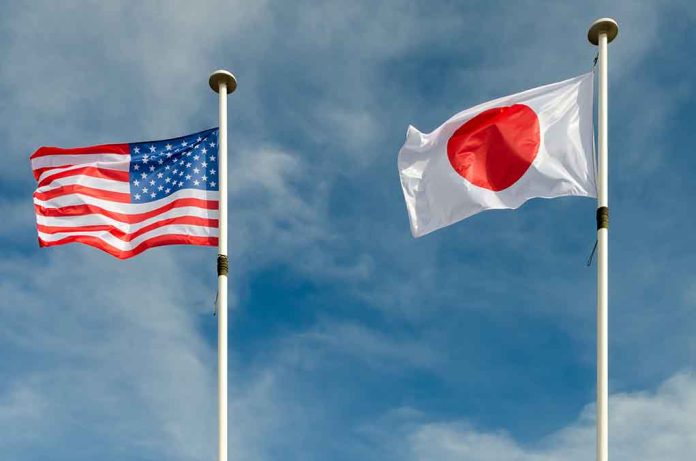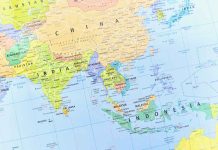
Japan’s new leadership faces a pivotal moment as the nation shifts its post-World War II security stance and grapples with economic recovery in a changing global landscape.
At a Glance
- Japan is abandoning its post-1945 security stance, increasing defense spending by 60% over five years
- The shift is motivated by Russia’s invasion of Ukraine and China’s aggressive regional behavior
- Japan is pursuing closer security ties with allies like Australia, South Korea, and NATO
- Economic recovery plans focus on resilience and sustainable development
- The new leadership must balance traditional values with modern challenges
A New Era in Japanese Security
Japan stands at a crossroads, poised to embrace a more assertive role in global affairs. The resignation of Prime Minister Fumio Kishida has set the stage for a leadership transition that will shape the nation’s future. As the world watches, Japan is shedding its post-World War II security constraints, driven by the stark realities of an increasingly volatile geopolitical landscape.
The nation has unveiled three critical strategic documents: the National Security Strategy, National Defense Strategy, and Defense Buildup Plan. These blueprints signal a dramatic shift in Japan’s approach to national security, with plans to increase defense spending by nearly 60% over the next five years. This move abandons a long-standing budget cap of 1% of GDP, reflecting the gravity of perceived threats from neighboring powers.
Responding to Regional Tensions
The motivations behind Japan’s strategic pivot are clear. Russia’s invasion of Ukraine and China’s aggressive behavior in the region have compelled Japanese leaders to reassess their nation’s vulnerabilities. In response, Japan is expanding its security interests beyond its own shores, focusing on maintaining a free and open Indo-Pacific region.
This new posture includes acquiring counterstrike missiles, creating a permanent joint operational headquarters, and bolstering cyberdefense and intelligence capabilities. The Japan Coast Guard will also be transferred to the Ministry of Defense during conflicts, further streamlining the nation’s defense apparatus.
Strengthening Global Alliances
Japan’s evolving security strategy extends to its international relationships. The nation is expected to strengthen its quasi-alliance with Australia and improve ties with South Korea. Additionally, Japan is pursuing closer security ties with the Philippines and key European allies. Its participation in NATO meetings and agreements with the UK on defense cooperation underscore its commitment to a more interconnected global security network.
Surprisingly, this shift has not faced significant opposition domestically or regionally. The Japanese public largely supports these measures, and neighboring countries, with the exception of China, have shown little anxiety over Japan’s more assertive stance. This broad acceptance reflects a shared understanding of the current geopolitical challenges facing the region.
Economic Recovery and Sustainable Development
While security concerns dominate headlines, Japan’s new leadership must also navigate the complex terrain of economic recovery in a post-pandemic world. The pandemic crisis has necessitated substantial fiscal stimulus packages, raising concerns about long-term sustainable development.
Japan’s approach suggests it is possible to protect public health and essential services while promoting resilience and sustainability. The nation’s fiscal stimulus packages, totaling JPY 234.2 trillion as of July 1, 2020, build on previous resilience-oriented measures. These efforts are part of a broader strategy that includes the Society 5.0 initiative and a commitment to the United Nations’ Sustainable Development Goals (SDGs).
Balancing Tradition and Progress
As Japan enters this new era, its leaders face the challenge of balancing traditional values with the demands of a rapidly changing world. The nation’s National Resilience Plans emphasize all-hazard disaster preparation, building back better, and inclusive governance. These principles reflect a commitment to preserving Japan’s cultural heritage while embracing innovation and global cooperation.
The coming leadership transition in Japan marks a pivotal moment not just for the nation, but for the entire Indo-Pacific region. As the country adapts to new geopolitical realities and economic challenges, its actions will ripple across the global stage. The world watches with keen interest as Japan charts its course through these turbulent waters, potentially emerging as a more influential player in international affairs.
Sources:
1. Japan: Staff Concluding Statement of the 2023 Article IV Mission
2. Japan’s burgeoning economic security strategy: Navigating amidst US-China competition
3. Japan’s Foreign Policy to Promote National and Worldwide Interests














